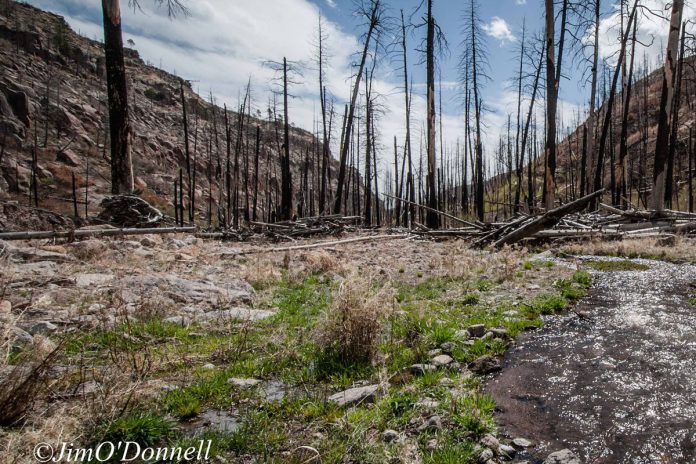Cli-Fi cuts too close to home. Climate Fiction isn’t exactly speculative fiction or science fiction. It is the right here, right now. Our destructiveness and carelessness already haunt us. We don’t have to look far to see that for vast chunks of the world this ‘fiction’ is all too real. Cli-Fi is both where we are and where we are going.
“Cli-Fi is charting its own course now. It’s on its way and it’s in the air,” Dan Bloom, literary critic and creator of the term “Cli-Fi” told me recently. “The goal is to reach people through emotions,” he says. And thank goodness. We need it. Climate Fiction helps us to comprehend the nearly incomprehensible.
Most people grapple with how we define the very concept of “climate change”. Climate change is more than the human-induced warming of the atmosphere. It is our whole way of being on this planet. Burning forest, rising seas, prolonged droughts . . . that is just a part of the climate crisis. The fact is that we’ve generally messed up. Everything. We’ve lost control of science, capitalism, industry, economy, energy and morality. Only the privileged can possibly still pretend this isn’t happening. And right now, at least, it is coming for all of us.
Philosopher Timothy Morton has developed the concept of the “Hyperobject” in an attempt to aid our cognition and comprehension of climate change. A Hyperobject exceeds our apprehension. It is everywhere. We see the manifestation of the Hyperobject at every turn. We feel it but we can’t grasp it. The Hyperobject undercuts our mastery of the world and is a harbinger of permanent change. The Hyperobject is a thing that is happening. It is happening to you. You are within it. It is within you. You drive it and it drives you. Climate change is the perfect example of a Hyperobject, says Morton, and it is only through the arts that we can get a handle on our new reality.
I’ve spent much of the last three years on an intensive study of Cli-Fi – an author learning from my colleagues by reading everything I can get my hands on. I’ve come to see that Climate Fiction as a genre is a masterful attempt to come to terms with the climate change Hyperobject.
Cli-Fi is decidedly dystopian. There has been a steady darkening of how we view the future. Even beyond the genre of Cli-Fi the most popular theme among science fiction authors these days are economic inequality, social injustice, racism and the growing divide between the wealthy and the rest of us. Gone are the days of hopeful science fiction like Star Trek. Societal failure and collapse has become an artistic selling point.
I’m far from innocent when it comes to dystopia. My recently published Cli-Fi short story Hanging, Just Outside the World (https://www.modernliterature.org/2018/03/01/hanging-just-outside-world-jim-odonnell/) imagines a young woman returning to her Chesapeake Bay – area home on America’s east coast just prior to the arrival of a Category 6 hurricane (yes, I know that category doesn’t currently exist).
Later this year I’ll publish another short story about climate refugees from Florida, Georgia and the Carolinas struggling for survival in squalid camps just outside Denver, Colorado. Both stories (and others under way) are set in an America – broke and rudderless – one-hundred years from now. It is an America that has failed to plan for or do anything about climate change and is now faced with a scrum of calamities and decay. In my world-building I pose scenarios that scientists foresee. I use real economics, real people and real scenarios. My story-lines for these works are deliberately straightforward. I seek to create an American future that is highly likely.
I’ve been writing dystopian Cli-Fi because I’ve felt it to be politically important and while I think that is still true I’m also beginning to think that writing in a vein of hope is equally as important.
The great value of art – especially creative writing – is that it allows us to imagine a different way of being. It allows us to ask how we might revolutionize our relationship with ourselves, our communities and the planet.
Morton makes the case that if you can understand climate change you are morally obligated to do something about it. If you can understand Hyperobjects then you are obliged both to care and do something about them. Authors of Climate Fiction inherently comprehend the Hyperobject. Therefore, we have a responsibility to act.
Our responsibility then, as writers, seems to be to be to imagine a better way. Our “petro-modernity”, as one literary critic put it, is broken. Capitalism as we know it has run its course. Climate change is forcing us in a new direction whether we like it or not. We need another way of being. So, my question is, can an inherently dystopian genre find an optimistic future?
An increasing number of Cli-Fi novels are indeed redefining the dystopia by challenging the way we think about the present. That is a start. Emily St. John Mandell’s Station Eleven, while bleak in its setting, offers an ending that teases a new, brighter future. Alexis Wright’s The Swan Book is set in a climate changed Australia where aboriginal peoples have been rounded up and fenced in to an infested swap while some cities are abandoned and others drown. Wright’s book, like that of Chang-rae Lee’s On Such a Full Sea posits a distinct awareness of the role colonialism and our inability to de-colonize plays in the climate crisis. Louise Erdich’s stark Future Home of the Living God and Lidia Yuknavitch’s Book of Joan challenge the very idea of evolutionary and social progress, asking what are we made of, what are the stories we tell ourselves and, ultimately, what is it that we truly love? Tobias Buckell’s Arctic Rising and Mark de Silva’s Square Wave each takes on the role our never ending neo-liberal wars play in the climate crisis and the resulting growth of the security state. And of course, Kim Stanley Robinson’s New York 2140, a massive, almost unreadable tome set in a world where the ocean has risen 15 meters. The Big Apple grapples with a heartless, avaricious capitalism. What stands out in this book however is that New Yorkers have adapted to the climate disaster. Kind of. There is hope.
It is my feeling that the focus on the dystopian not the utopian in our cultural storytelling is a result of artistic (and above all political!) faint-heartedness. I think many writers are intimidated when it comes to imagining our way out of the mess we’ve created. But it is also true that imagining a better future is just plain hard. Utopias are simply more difficult than dystopias.
And yet change is afoot.
I recently stumbled on the genre known as Solarpunk after Rose Alexandre-Leach, an editor at Green Writers Press in Vermont pointed the way. While Cli-Fi is arguably the realistic present, Solarpunk or some genre like it might represent the realistic future.
Solarpunk began with a Brazilian publication and then quickly blew up online (with huge credit going to Tumblr users). The genre really took off last year with the publication of Sunvault: Stories of Solar Punk and Eco-Speculation and EcoPunk: Speculative Tales of Radical Futures from Australia. This summer the anthology Glass and Gardens: Solarpunk Summers will be available.
Solarpunk aims to envision what a sustainably society might look like. It centers around themes of hope, resilience, community, renewal, resistance, gender and racial equity and nature. The genre claims to create a place for everyone. This is a generally climate-friendly future. Above all, Solarpunk asks that we re-imagine our relationship with energy. Solarpunk sees energy infrastructure as it should be: a political question, not an economic one.
The Solarpunk genre in general seems to ask: how can we leverage a massive restructuring of our energy supplies to arrive at a fairer economy and society? Because, after all, to survive the climate crisis, we will have to create a more equitable society.
Yet there are some very problematic challenges inherent in the genre. While Solarpunk claims to create a place for everyone it doesn’t. Non-utopian ways of thinking are simply not tolerated in the Solarpunk I’ve read. There is a certain fascism of ideals. Other ways of thinking and being are often shunned, undercutting many of the ideals ostensibly inherent in the genre. We need to be cautious with our ideals. Utopias can easily become fascist hellholes.
There is also a potentially problematic genre blending that goes right along with the barrier-breaking nature of Solarpunk. I have no problem with genre blending in general. There are far too many silly barriers to be busted. But it seems to me that Solarpunk borders on fantasy at times and I wonder if that is useful. There are often elven, Tolkien-like imagery, magic and even dragons. In some stories the dragons and the magic return once humans begin treating the Earth with the respect she deserves. In others the tropes of fantasy are used to represent something that has yet to be developed. Magic is the state of being we should aim for, we are being told.
As a creator I understand these metaphors and visions, but they rub me the wrong way. It smacks as a type of nostalgia we can hardly afford. Why must we pull on the tropes of Medieval-like fantasy to imagine and equitable and ecological future? The genre blending with fantasy exposes how limited we often are in taking on the challenges we face and smashing the hegemony as artists.
Most of the Solarpunk stories I’ve read thus far are indeed post-apocalyptic. This doesn’t mean they are dystopian. While the end result may be somewhat brighter, the assumption is that something very bad had to happen first. The assumption is that only after the collapse could we make the shift. Again, therein lies a problem. How can we fix the myriad climate, economic and social challenges without a massive dystopian collapse? So far, no one seems to have that answer. No matter what, we crash.
This failure is a direct reflection of the way we live our lives today. We are stuck in the mindset of our consumption and exploitation. Of course, there are visionaries here and there but for the most part we are trapped. Our culture – at least at the moment – refuses to entertain alternatives. And that just won’t do.
Speculative fiction allows us license to think beyond the Gramscian-like hegemony that constrains our thinking. It gives us a place where we can stop being “reasonable”. In that unreasonable-ness we must look beyond the science of climate change and imagine a political revolution without an apocalypse.
No one writer individually re-imagines the future. We do it collectively through our works. Sci-Fi has always been a tool to expand political consciousness. More people read Sci-Fi that news according to a number of polls. We creative authors can have a far larger influence on the future than can journalists.
As climate change becomes even more pronounced, we can’t allow capitalism to decide who gets – and who doesn’t get – access to sustainable technologies and high, dry land. We can’t have a future where the rich live in Solarpunk utopia while the rest of us suffer in Cli-Fi dystopia. And, right now at least, that is where we are headed. Cli-Fi and Solarpunk are already inherently political. The choices of distribution of resources matters. Endless “growth” is impossible and out of control.
Throughout history we see societies that have gone through painful transformation or collapse. We don’t have to follow those paths. We can – and must – avoid a violent and chaotic transition.
Allow me to offer up some admittedly limited suggestions I’ve pulled from various readings that might help in visioning a new future. First, we will need to prioritize ecosystems. Second, Neo-liberalism has to be stopped. Third, there needs to be a debt jubilee for both poor nations and individuals in both rich and poor nations. There should also be a heavy tax on extreme wealth. Everyone should have access to a basic income. Speaking of that, we will simply need to rethink the very concept of “work”. Above all, focus on peace and prosperity and justice for all.
How do we accomplish these ideals without a chaotic transition? The oligarchy and racists won’t go easily into the new world. My request is that we creatives envision that transition without an apocalypse.
Capitalism is failing. That much is clear. How fast it will fail and what will replace it remains much less clear. Will we creatives have an alternative vision ready in time? Can we vision an ecologically-based Post Capitalism without a collapse? Ruins are beautiful and fascinating. Dystopian fantasy is alluring. But our future shouldn’t rest on an imagined past. We can write our way to a better future.
About the author:
Jim O’Donnell is an award winning wilderness advocate, author and conservation photographer based in Taos, New Mexico. His work has appeared in National Geographic Maps, Discover, Scientific American, Ensia, Sapiens, BBC Travel, Sierra, CityLab, New Mexico Magazine, and YaleEnvironment360 among others. A Fellow at the League of Conservation Writers, Jim is the author of “Notes for the Aurora Society: 1500 miles on foot across Finland” and a wide range of environmental essays and fiction short stories. Increasingly, Jim’s focus is on the forced migration of human beings due to climate change. He leads yearly photography tours to Cuba. Learn more at his websites https://www.jimodonnellphotography.com/ and http://www.jimodonnellauthor.com/
















